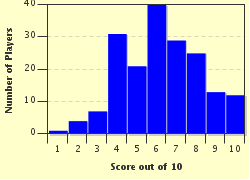Quiz Answer Key and Fun Facts
1. Cludeo or Clue was a popular game for my sisters and me when we were young. What though is NOT a name of one of the suspects in the UK version of the game?
2. The next game on my list was a strategy board game, where two players had to sink their opponent's fleets. What was the name of this game that took its title from an officer's rank in the navy?
3. The next game on my list involved building an elaborate trap as you moved around a board, where if you were unfortunate, your piece got trapped at the end of the game. What was the name of this game that took its name from a device to catch rodents?
4. Playing, Monopoly was another favourite pastime of mine as a child and I occasionally play it on my computer. However, am I right there is only one edition of Monopoly though that I can play?
5. Which board game title have I made up?
6. Scrabble was another favourite board game of mine as a child and I still play it from time to time on the computers. Which of the following words, though, would score the most points in Scrabble (without bonus squares)?
7. The next game on my list involved prisoners of war escaping from a castle, having to dodge one player acting as the German guards. What was the name of this game?
8. From time to time, my sisters and I would play, Snakes and Ladders. What word though replaces, "snakes" in the American version of this game?
9. Not strictly, a board game, more a trivia game with dice, what was the name of this game based on a long running BBC sports quiz programme?
10. What is the American name for the British game called "Draughts"?
Source: Author
mcsurfie
This quiz was reviewed by FunTrivia editor
WesleyCrusher before going online.
Any errors found in FunTrivia content are routinely corrected through our feedback system.

